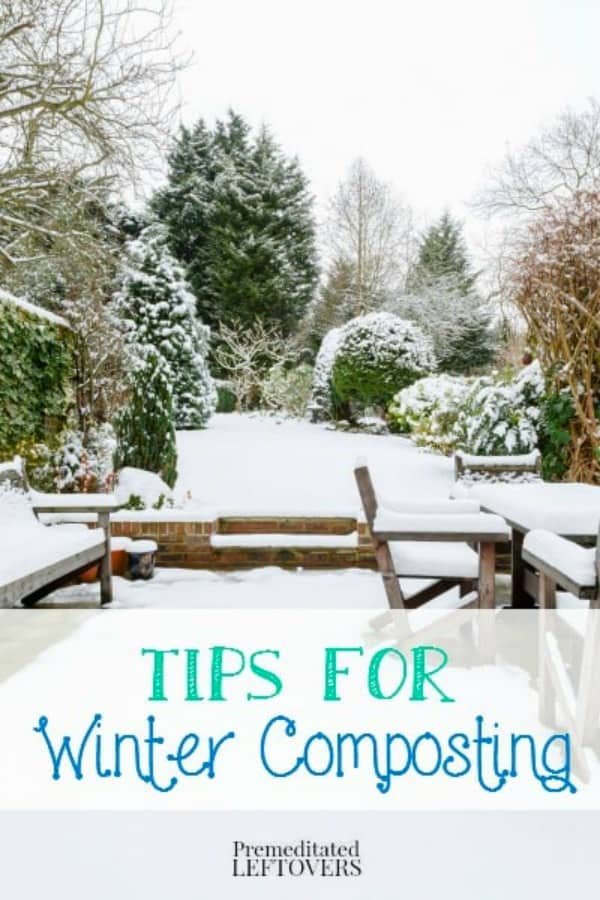Use these tips for winter composting to keep your compost pile going all winter long.
Composting is an excellent way to not only use up your food and lawn waste, but also create bountiful gardens. Because traditional composting is a heated process where bacteria break down organic material, it can be a challenge for those folks that live in climates that have a very cold Winter season. Here are some Tips For Winter Composting to help you out.
Tips for Winter Composting
Keep things well insulated and warm. You can buy insulated tumblers for this purpose. It helps keep the cold air out so the bacteria stay active. If you don’t have the money for an insulated tumbler, there are still some things you can do. If you have a bin that can be moved, moving it just inside the garage can help keep the brisk air away. If you can’t move yours, think of ways you can protect it. This is an important factor to consider when starting your compost. If yours is a compost pile and not contained to a bin or structure, consider covering it with a tarp or building a structure to protect it. You can make a simple structure out of scrap wood or even bricks, just as long as you have something to keep the cool wind out of it. The snow that many cold environments get is not always such a problem either, as snow can actually help insulate from the dip in temperatures.
Make sure to keep your pile or bin active by continuously adding to it. You need to keep not only organic material, but the right kind. In the fall, rake up some leaves to add during the winter in parts. Adding a little bit every time you turn your compost and aerate it can help keep things active. You also need to make sure you are balancing out what the bacteria need to thrive on with a good mix of brown and green material. Brown material is anything that is carbon producing (such as the leaves) and green material is anything that is nitrogen producing such as most vegetable kitchen scraps.
Make sure to keep your new compost material small. Since the cold weather will likely slow down your composting, adding things that are already small will help. Crunch the leaves you add to make smaller particles, and when you add new kitchen scraps, make sure to chop them finer as well.
Don’t turn over your pile as frequently. This may seem counter-productive, but turning over your pile or tumbling your bin can actually add cold air into your compost that can damage the frail system inside. When the weather is warm, you turn with almost every addition of new material, but in the winter, try to do it as low as once every couple of weeks.
Keep things moist, but don’t over-water. The dry winter air can leave your compost begging for moisture, but be sure to only add it in small quantities and don’t do it when the weather is extremely frigid. This can cause the moisture inside to freeze and end your composting process.
Do you have any tips for winter composting? I would love to hear them!
More Composting Tips
How to Make Leaf Mold and Use it in the Garden


Jan Barber says
I am on a small bit of property and not able to build a compost pile or bin. Reading on Pinterest, I found directions for composting in black plastic bags, even in winter. It can take a bit longer, but the sun heats the plastic nicely. The first batch I started in November of 2023, and used it in late spring of 2024. I have access to chicken, turkey, horse and rabbit manures. I balance the mix with chopped hay or straw, grass clippings saved from summer, dried chopped leaves, cut up brown packing paper and egg cartons as well as cardboard, used coffee grounds and even coconut coir. I can keep the weight the right size to be able to turn the contents either with a bit of rolling or getting down and dirty with my hands, I hope this helps someone working on a smaller scale and tight budget.
Jim landis says
I compost everything I possibly can !!!! Right no meat scraps etc. my question to u is – I’m hearing ( reading) citrus is a not so good thing to compost it is like not a happy thing for the worms !!!!
I put citrus shells in my bin 4/5 times a week-along with everything else / yes cut very small – I’d like ur opinion on citrus in compost bins !!!
Alea Milham says
The citrus peels will not hurt the worms, but worms don’t like to eat them. They will still break down slowly on their own. I add citrus to my compost because I am not relying entirely on worms to break down the food.
yolande says
hello I made my compost din of bricks, made it as a Mason. two stores of a sqare meter and 1 meter high it becomes verry warm and I have marveloes compost, every year. I live in the Netherlands.